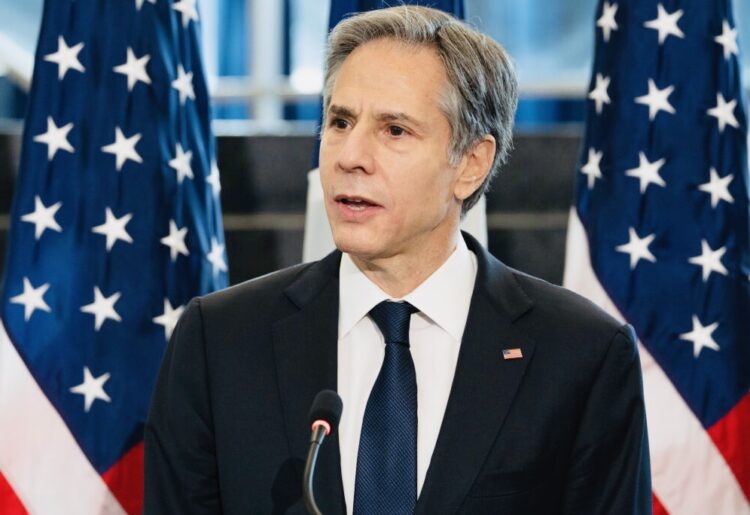Iran, Israel’s regional rival and arch enemy, is moving closer to joining the nuclear club, a prospect that would unsettle and destabilize the Middle East.
Two months ago, the International Atomic Energy Agency reported that Iran has enriched enough weapons-grade uranium to make at least several nuclear bombs in just a matter of days and may have already begun advanced work to build deployable warheads.
Last month, the United States, Britain, France and Germany warned that Iran may well be on the cusp of becoming a nuclear power. “Iran is growing its stockpile of high-enriched uranium” to unprecedented levels, they said.
Around the same time, U.S. Secretary of State Antony Blinken warned that Iran can now produce enough fissile material for an atomic bomb in as little as a week.

He blamed Donald Trump, the previous U.S. president, for Iran’s sprint toward nuclear capability.
When Iran signed the 2015 nuclear agreement, which froze its nuclear program in exchange for sanctions relief, Iran was about a year away from a breakout capacity to assemble an atomic bomb. Since Trump’s unilateral withdrawal from the nuclear accord in 2018, however, Iran has edged far closer to this capability, Blinken said.
Shortly after Blinken issued this warning, the United States announced fresh economic sanctions on Iran. “We’ve imposed more than 600 sanctions on Iranian persons and entities,” he said. “We haven’t lifted a single sanction.”
He added that the United States would not allow Iran to obtain a nuclear weapon and would be prepared “to use all elements of (our) national power to ensure that outcome.”
In accordance with its preference to use diplomacy to curtail Iran’s nuclear ambitions, the United States and the other signatories of the Iran nuclear agreement — Britain, France, Germany, Russia and China — engaged Iran in on-again, off-again negotiations to restore it.
When these inconclusive talks collapsed, the United States attempted to reach an informal, unwritten agreement with Iran. Under its terms, Iran would not be permitted to amass a stockpile of highly enriched uranium to bomb-grade purity.
This process yielded no concrete result, leaving Iran free to do what it desires.
Israel feared that an understanding between the United States and Iran might reduce Western economic pressure on Iran and possibly lead to a revival of the original accord, which the Israeli government staunchly opposed.
Israel detected weaknesses in that ground-breaking deal, arguing that one of its major flaws was that Iran was permitted to keep its major enrichment facilities intact. Israel believed they should be completely dismantled. Israel, too, feared that once the agreement expired, Iran would race toward nuclear capability.
Convinced that Iran was hell bent on ultimately acquiring a nuclear arsenal, Israel tried to sabotage its nuclear sites and assassinated several of its scientists in a series of clandestine operations.
Pushing back, the major powers contended that the agreement was beneficial inasmuch as it sharply curtailed Iran’s ability to produce nuclear fuel and obliged Iran to ship 97 percent of it to Russia.
Until recently, Iran insisted that its highly-classified nuclear program was exclusively for peaceful purposes, a claim that few took seriously. But since its unprecedented rocket and missile exchange with Israel last April, Iranian officials have said that Iran will have to “reconsider its nuclear doctrine.”
These comments confirm Israel’s belief that Iran is intent on obtaining nuclear arms, and that a nuclear-armed Iran would be an intolerable threat to its very existence.
Although the Israeli government has been preoccupied by wars with Hamas and Hezbollah in the Gaza Strip and Lebanon, Israel remains consumed by the specter of a nuclear-armed Iran. In his discussions with top U.S. officials in Washington recently, Israeli Defence Minister Yoav Gallant raised this issue.

The Institute for National Security Studies at Tel Aviv University believes that Israel should not lose sight of it.
“Israel risks losing the more important strategic battle: preventing a nuclear Iran. This severe development, if it occurs, threatens Israel’s national security more gravely than it does any other international or regional actor. Therefore, without Israeli mobilization to spur the international community into action, Iran will continue to progress until it feels secure enough to take the next step toward acquiring a nuclear bomb.
“To advance this urgent strategic goal, Israel must aim to end the fighting in Gaza, stabilize the north and other fronts, and rebuild its international standing in order to focus attention on the dangerous and concerning progress of Iran’s nuclear program.”
Iran, due to its increasingly close ties with Russia and China, is not as vulnerable to Western sanctions as before. Currently, Iran exports nearly 90 percent of its oil to China, compared with roughly 50 percent in 2020. And since Russia’s invasion of Ukraine in 2022, Iran has provided Moscow with drones and, possibly, ballistic missiles.
Which means that Iran is less immune to Western pressure and can proceed with building its nuclear infrastructure.
